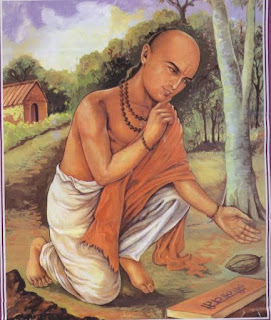Leelavati was the daughter of famous Mathematician and Astrologer Bhaskara2.
Bhaskara was apprehensive about his daughter's inquisiveness and curiosity. The little girl Leelavati asked her father many questions and gained a lot of knowledge this way. As she grew up, Bhaskara decided to get Lilavati married. In this process, Bhaskara perused Lilavathi's horoscope. He was shocked when he found out that Lilavati would not have a happy married life if she did not get married at a particular auspicious time. He did not tell Lilavati about this, as he despised hurting his daughter. He made all arrangements to make sure that Lilavati would get married at the auspicious time. In order to make sure that he did not miss this particular time, he kept a cup with a small hole at the bottom of a vessel filled with water, arranged so that the cup would sink at the beginning of the destined auspicious hour. He forewarned Lilavati not to go near the vessel. When Bhaskara was not around, Lilavati, could not hold her curiosity and went to see what her father had devised. When Lilavati went close to the device, she bent forward to get a closer look. A little pearl from her nose ring fell into the water. She rushed back in a hurry so that her father would not find out what she was up to. The little pearl at fell into the water upset the calculations made by Bhaskara and the wedding took place, but not at the auspicious hour. As destined, Lilavati's husband died a few days after the marriage. Bhaskara brought back his widowed daughter to his residence. She seemed disinterested in the normal day to day activities. Bhaskara found it very difficult to see these changes in his daughter. He thought of a way to get her out of her depressed state. He posed arithmetic problems at Lilavati about the things around her and asked her to find the solutions to the problems. Lilavati the brilliant girl that she was, solved all the problems posed to her. Lilavati's mind which was busy in solving the problems posed by her father never again got depressed.
Bhaskara wrote Siddhanra Shiromani in 1150 AD. This colossal work is divided into four parts. Lilavati, Bijaganita, Ganitadhyaya and Goladhyaya and consists of about 1450 verses.
Bhaskara was apprehensive about his daughter's inquisiveness and curiosity. The little girl Leelavati asked her father many questions and gained a lot of knowledge this way. As she grew up, Bhaskara decided to get Lilavati married. In this process, Bhaskara perused Lilavathi's horoscope. He was shocked when he found out that Lilavati would not have a happy married life if she did not get married at a particular auspicious time. He did not tell Lilavati about this, as he despised hurting his daughter. He made all arrangements to make sure that Lilavati would get married at the auspicious time. In order to make sure that he did not miss this particular time, he kept a cup with a small hole at the bottom of a vessel filled with water, arranged so that the cup would sink at the beginning of the destined auspicious hour. He forewarned Lilavati not to go near the vessel. When Bhaskara was not around, Lilavati, could not hold her curiosity and went to see what her father had devised. When Lilavati went close to the device, she bent forward to get a closer look. A little pearl from her nose ring fell into the water. She rushed back in a hurry so that her father would not find out what she was up to. The little pearl at fell into the water upset the calculations made by Bhaskara and the wedding took place, but not at the auspicious hour. As destined, Lilavati's husband died a few days after the marriage. Bhaskara brought back his widowed daughter to his residence. She seemed disinterested in the normal day to day activities. Bhaskara found it very difficult to see these changes in his daughter. He thought of a way to get her out of her depressed state. He posed arithmetic problems at Lilavati about the things around her and asked her to find the solutions to the problems. Lilavati the brilliant girl that she was, solved all the problems posed to her. Lilavati's mind which was busy in solving the problems posed by her father never again got depressed.
Bhaskara wrote Siddhanra Shiromani in 1150 AD. This colossal work is divided into four parts. Lilavati, Bijaganita, Ganitadhyaya and Goladhyaya and consists of about 1450 verses.

No comments:
Post a Comment